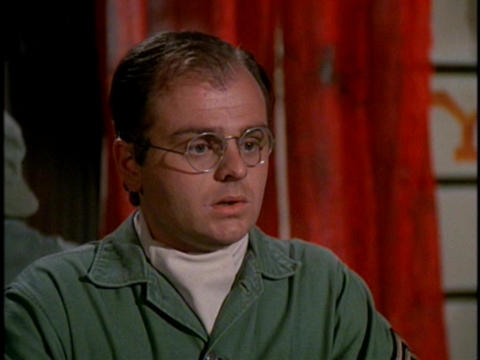Every Monday, I spotlight a random episode of M*A*S*H, providing a brief review and asking readers to offer their thoughts.
“The General’s Practitioner” (#116, 5×20)
Originally Broadcast: Tuesday, February 15th, 1977
Written by Burt Prelutsky
Directed by Alan Rafkin
Capsule Summary: A general wants Hawkeye to serve as his personal physician. Meanwhile, Radar cares for a South Korean woman and her baby.
I really like the A story in this episode, even if Hawkeye is a little too sanctimonious at times. The A story has as much to do with Colonel Potter as it does Hawkeye. Potter keeps his cool when Colonel Bidwell comes sniffing around looking to poach his best doctor. He tells Bidwell the truth and lets him experience firsthand Hawkeye’s attitude as well as his skill. He must have been annoyed when General Korshack showed up after assuming he had taken care of things with Bidwell.
It’s hard to say whether Hawkeye played up his joking, insolent manner in front of General Korshak. It was nice to see a general who wasn’t depicted as cruel or incompetent, just a little selfish. Korshak could have (and if this was real life probably would have) simply had Hawkeye transferred to Tokyo without worrying about his feelings on the matter.
Instead, he asked Hawkeye to give him a physical as a demonstration of his doctoring. Hawkeye took the physical seriously, despite continuing to joke, and that more than anything probably convinced Korshak to let him remain at the 4077th. Well, that and the fact that with Hawkeye around Korshak would probably be forced to stop smoking, stop drinking, and lose 20 pounds.
Radar’s B story, on the other hand, is terrible. I know we’re supposed to feel sorry for Radar when Mulligan returns and be impressed that Mulligan decided to return. But I don’t. Mulligan asking Radar to look after his girl is a little sleazy to begin with and that’s before Radar learns there’s a baby involved.
Just what exactly did Mulligan expect Radar to do? He asked him to be Mai Ping’s friend and to treat her nice. How long could Radar go on acting like as a surrogate husband to Mai Ping and a surrogate father to the baby? There’s no indication that Mulligan planned to support his Korean family once he returned to the States. He abandoned them. Radar was forced to steal food from the 4077th to feed them. Mulligan is not a nice guy.
It certainly doesn’t help that Radar’s naiveté is played up, particularly when Mulligan asks him to look after Mai Ping. Radar first wonders if Mulligan needs him to take care of a very precious, very beautiful gird. He’s then shocked and confused to discover Mulligan is talking about a real girl.

Father Mulcahy has exactly one line in this episode and it consists of just one word: “Mechanics?”.
I love Radar’s laugh in the mess tent as he walks past Hawkeye who’s saying “I’d be in the back seat of a ’46 DeSoto schnuggling with Wanda Lamperski.”
It’s unclear how long Radar was looking after Mai Ping and the baby before Mulligan returned. Was it a few days? A few weeks? Radar tells B.J. he worries if a day goes by and he doesn’t see the baby. But Mulligan was presumably leaving for Seoul right away. When he returns he tells Mai Ping he made it to Seoul before he realized he couldn’t leave her. That suggests it was a few days at most. Not nearly long enough for Radar to get so attached to his surrogate family.





I don’t mind this episode too much, and I will agree that the A story is much better than the B story. There is something I would like to add though: it’s been discussed that Radar’s naivete is played up in this episode, and it is, but something tells me Mai Ping is a little on the naive side as well. Does she assume that any man looking out for her is just automatically her husband/father of her baby? Despite her and Mulligan seemingly loving each other, she’s quick to shower Radar with devoting, from holding onto his arm, to kissing him on the cheek, to even telling him the baby looks like him. She also seems incredibly young too, doesn’t she? That probably has something to do with it.
But again, the A story is much stronger, and is a great representation of Hawkeye’s character: completely anti-military, and opposed to the war, but dedicated to his work and saving lives. I also really like this exchange:
HAWKEYE: The Colonel drinks.
POTTER: Only in groups of one. Or more.
Not a super big fan of this episode, and your description of Hawkeye as “sanctimonious” is exactly why. Even that exchange with Potter and Bidwell about Hawkeye being a sore loser when it comes to death, yeah it’s a fitting description of the character, but the declaration is just wayyyy too heavy-handed for me.
And Radar’s storyline IS awful.
One thing I didn’t like in this episode was the entire “don’t let the bastard win” scene. Since nothing similar occurs in any other episode, it comes off as too contrived here.
I always thought Mulligan was returning to the states alone to “smooth the way” before bringing his Korean family there.
FWIW, Larry Wilcox, who played Mulligan, was a decorated Marine vet who served in Vietnam during the Tet Offensive. After MASH he became well known for playing Officer Jon Baker on “CHiPs”.
Something similar to ‘Don’t let the bastard Win’ did happen one other time, in one of the seasons with Henry Blake, where Pierce is pissed cause one of his patients died, and Blake snaps at him about the ‘Rules of being a doctor’.
Potter’s right, Hawk’s a Sore Loser with Death.
Hawkeye’s reaction to the idea of being the General’s personal physician was totally in character-he was there to work, and Bidwell seemed more concerned with his own needs instead of the thousands of wounded that Hawkeye worked on.
Radar’s story was similar to the one BJ faced in “BJ Papa San” and Mulligan didn’t seem like such a bad guy if he was willing to come back for his Korean family.
Another funny exchange
General:”This guy kills me!”
Pierce:”What higher praise for a physician?”
After finally convincing Korshack that the boys come first, without missing a beat Hawkeye flips back into sarcastic mode.
ORSHACK: I can take orders too.
HAWKEYE: Good. I’ll have a corn beef on rye with mustard.
Can we talk about the fact that there is a giant bowl of REAL EGGS in the kitchen???
Also – why does Mai Ping call Mulligan by his last name?
I don’t really like this episode mainly because nothing stands out.
Hawkeye: War is war and hell is hell, and of the two, war is a lot worse.
Mulcahy: How do you figure, Hawkeye?
Hawkeye: Tell me, who goes to hell?
Mulcahy: Sinners, I believe.
Hawkeye: Right. There are no innocent bystanders in hell. But war is chock full of them.
A powerful message if ever there was one
Amen! Great point Doc Funnypants.
Father Mulcahy has another line in the episode: “How do you figure that, Hawkeye?” in the OR when Hawkeye says war is worse than hell.
My favorite exchange (I guess it’s since I’m a poker player)
Potter: “I’m glad you boys like it here, I almost lost you (Hawkeye ) today.”
Hawkeye: “In a poker game?”
Potter: “I’d never throw you into the pot unless I had at least two pair.”
Hawkeye: “Thank you colonel.”
Father Mulcahy was wrong……
Hawkeye: Tell me, who goes to hell?
Mulcahy: Sinners I believe.
Wrong, only those that do not profess that Jesus Christ is their Lord and Savior go to hell.
If all sinners go to hell….everyone ever born would be there except one Man.
Incorrect — as that only applies if your religion is Christianity. Other religions have different teachings about the afterlife
Colonel Potter to Hawkeye:
“You were absolutely disgraceful – and I think I’ll buy you a drink.”
Didn’t really understand why Potter was so tipsy in the scene in his office with the general.
My two favorite moments were, the Don’t Let the Bastard Win’ line, and the War is War and Hell is Hell discussion, because they show two similar sides of Hawkeye.
One shows Hawkeye as a Sore Loser against Death, and the other shows his hatred for the war he was forced to heal people, who risk dying even if he did his best.